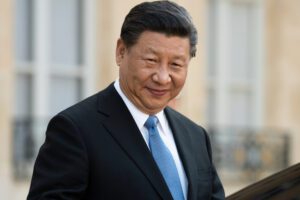Post Content
April 21, 2025
Post Content
The head of Zopa has suggested that London’s political and regulatory stability could become a competitive advantage for the capital’s financial markets, as businesses increasingly look to escape growing uncertainty in the United States.
Jaidev Janardana, chief executive of the digital bank, said concerns around a volatile tax and tariff regime in the US had prompted his company to reconsider the appeal of listing in New York. “I would be surprised if that’s not the case more generally as well,” he added, referring to other globally-minded businesses.
Zopa, which achieved unicorn status with a $1 billion valuation in its last funding round, has long been considered a strong IPO contender. However, Janardana made clear that the current climate made a flotation unlikely in 2025, noting that “an IPO is not a priority” while market sentiment remains subdued.
Even so, he struck an optimistic tone about the prospects for a future listing, possibly as early as next year. “I’m optimistic that maybe [at the] back end of this year, maybe early next year, things will start to look better for UK-listed companies,” he said.
London’s reputation for rule of law and political predictability could become increasingly important for firms navigating geopolitical turbulence, Janardana suggested. “Respect for rule of law [is] some of the things people will start to appreciate more, given the way the world is going.”
Despite Zopa’s international investor base – which includes Japanese investment giant Softbank – Janardana said the UK focus of the business makes a London IPO more logical. Still, he added, “we’ll keep our options open”.
He welcomed recent reforms aimed at making the City more competitive but warned that companies themselves must take responsibility for restoring confidence in London listings. “Part of the reason why some of the UK IPOs have struggled is that companies haven’t delivered on the expectations that were there,” he said.
Founded in 2005 as the world’s first peer-to-peer lending platform, Zopa transitioned to a fully-fledged bank in 2020. Today, it offers personal loans, savings products and credit cards to over 1.3 million customers, and holds more than £5 billion in deposits. In 2023, it posted a maiden pre-tax profit of £15.8 million, supported by rising net interest income.
Its latest financial results are due to be published on Thursday. In December, the company secured £68 million in new capital from investors including AP Moller Holding, the owner of Maersk. Janardana confirmed that Zopa does not anticipate returning to the market for further fundraising until at least next year.
While the bank has benefited from higher interest rates, Janardana said a cut in borrowing costs would be welcome if it encouraged consumer demand. “Appetite for borrowing has been weaker since the start of the year,” he noted, pointing to lower confidence and the knock-on effects of employer national insurance hikes, which he said had dampened wage growth expectations.
Addressing concerns over the economic impact of potential Trump-led US tariffs, Janardana struck a surprisingly upbeat note. He argued that the inflationary impact on the UK would be minimal, and might even have a deflationary effect. “Higher levies that might be applied to other countries could make trade between Britain and other markets easier and cheaper,” he said.
Read more:
London IPO market could thrive as US instability mounts, says Zopa chief
China has been cautioned against retaliating to President Trump’s aggressive new tariff regime by offloading its massive holdings of US government bonds — a move that analysts warn could damage its own economy more than it harms Washington.
Earlier this month, Trump imposed sweeping tariffs of up to 145 per cent on Chinese exports to the US, sparking fears of a renewed economic confrontation between the world’s two largest economies. The drastic escalation has led to speculation that Beijing could strike back by selling off a significant portion of its US treasuries, a strategy that could destabilise American financial markets by pushing bond yields even higher.
However, analysts are urging restraint, warning that such a move would come with serious financial and strategic drawbacks for China itself.
“The concern is that China might dump its vast holdings of treasuries, even if that risked major side effects like racking up huge losses on its own portfolio and undermining its competitiveness against the US by driving the [yuan] renminbi back up against the dollar,” said John Higgins, chief markets economist at Capital Economics.
China is the second-largest foreign holder of US government debt after Japan, with more than $700 billion in longer-dated treasuries. Japan, by comparison, holds over $1 trillion. If Beijing were to significantly reduce its holdings, it could trigger panic across global markets already on edge over the US administration’s protectionist policies.
Bond yields, which rise as prices fall, have already surged to levels not seen since last October — a shift that has raised eyebrows among analysts. While some hedge funds have reportedly been forced to liquidate treasuries amid a spike in volatility, the speculation around China’s involvement remains inconclusive.
Data from the US Federal Reserve and Treasury suggests that China sold approximately $5 billion in US bonds in February, predating Trump’s so-called “liberation day” announcement on April 2. More recent movements are harder to trace with certainty, though analysts say there’s currently no hard evidence of a large-scale sell-off by Beijing this month.
According to Barclays, any bond sales by China are more likely linked to currency stabilisation efforts rather than a deliberate attempt to pressure US borrowing costs. That distinction is crucial, as Chinese authorities face mounting pressure to defend the yuan in the face of rising tariffs — but any major treasury liquidation could have the opposite effect by strengthening the currency and eroding export competitiveness.
China’s central bank and state-managed investment funds also hold an estimated $3 trillion in dollar-denominated assets. A US bond market crash would severely dent the value of those holdings, undermining broader financial stability in China at a time when growth is already slowing.
Meanwhile, traditional safe havens such as US bonds and the dollar have failed to provide shelter in the latest round of market turbulence. Both have experienced falling prices alongside American equities, suggesting a broader crisis of confidence in dollar-based assets.
As the standoff between Washington and Beijing intensifies, policymakers in both capitals may be forced to weigh short-term leverage against long-term economic consequences. For China, analysts say, a treasury dump may ultimately be more symbolic than effective — and potentially self-destructive.
Read more:
China warned against dumping US bonds as retaliation for Trump tariffs
The ruling classes and their media blamed the 2008 financial crisis on free markets and too little government regulation. However, because the Federal Reserve promised to help cover losses in financial markets, it practically invited reckless behavior.


